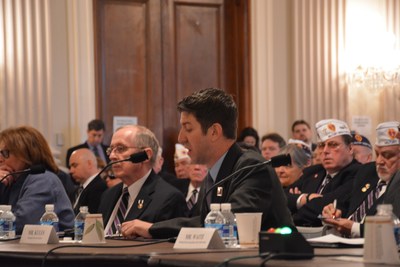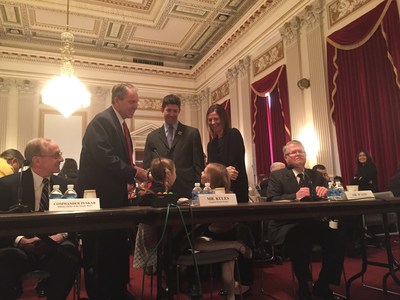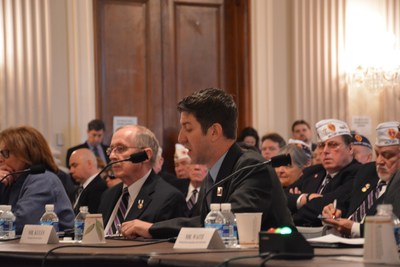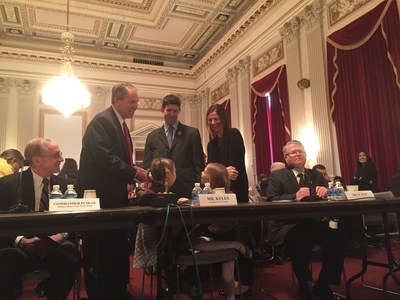Wounded Warrior Project Doubles Down on Advocacy Efforts on Capitol Hill
WASHINGTON, April 5, 2016 /PRNewswire-USNewswire/ -- Since its founding in 2003, Wounded Warrior Project® (WWP) has recognized the importance of not only impacting the lives of wounded veterans, their caregivers, and families through direct programs and services, but also by working to improve the care and benefits systems which serve them. Today, WWP reaffirmed its commitment to the legislative priorities that will improve these systems and the quality of life of wounded veterans for a generation.

"For more than a decade, the Wounded Warrior Project mission of honoring and empowering Wounded Warriors has improved the lives of injured service members, their families, and caregivers," said Jeremy Chwat, chief strategy officer at WWP. "Creating the Traumatic Service Member Group Life Insurance program in 2005 and, later, passing the Caregivers and Veterans Omnibus Health Services Act were tremendous legislative and advocacy achievements, and we count their adoptions as monumental successes both for wounded veterans and for our organization. Today, as we've done each year since our founding, we reaffirm our unbending commitment to pursuing legislative remedy to the major issues facing the warriors and families we serve to ensure that this is the most successful, well-adjusted generation of wounded service members in our nation's history. We know that through direct engagement of our nation's legislators and leaders, we can make this happen."
WWP continues to advocate on behalf of wounded veterans, by asking Congress to close a loophole in TRICARE/Medicare coverage that costs some injured service members more than a thousand dollars each year, and more importantly, puts at risk these warriors access to health insurance benefits for them and their families. Ryan Kules, Combat Stress Recovery Director at WWP, testified before the House Committee on Veterans Affairs on March 3, to the difficulties that many veterans face through payment plans with Medicare and TRICARE.
"I was wounded in Iraq in 2005 when my vehicle struck an improvised explosive device, severing my right arm above the elbow and my left leg above the knee. Because of my injury, I could not work for a period of time and became eligible for Medicare in 2007," Kules explained. "I lost the TRICARE benefits that I had earned as a military retiree. Even though I later improved to the point where I could return to work, I remained eligible for Medicare and have thus been barred from traditional TRICARE plans for the last eight years. In the next few months, I will finally be able to transition back to the more reasonably priced TRICARE plan I prefer. But my family, like so many others, has felt for the last eight years as though we were being made to pay an extra annual expense of almost $1,000 for no reason at all."
Another major legislative priority for WWP is to alter the medical coverages available to wounded veterans who wish to start a family but are unable to do so, due to the nature of their injuries sustained in service. WWP is pushing VA to cover fertilization treatments for veterans who fall into this category; treatment already offered to active-duty service members by the Department of Defense.
"Rooted now in twenty years of established medicine, in vitro fertilization can be an effective solution for many injured veterans," said Kules. "Because it lacks congressional direction, however, the Department of Veterans Affairs believes it cannot offer this treatment, which leaves veterans to pay expensive out of pocket costs themselves. This is a result which, in our view, is simply unacceptable. When a man or woman volunteers to serve and suffers injury as a result, it is incumbent on us to make them whole to the extent science will allow. These men and woman want only the very basic right to start a family and move forward in their lives. War took that away from them, and we should not place them in the position of paying tens of thousands of dollars if they want to get it back."
Through its advocacy and Congressional engagement activities, Wounded Warrior Project® (WWP) has effected major legislative action on behalf of wounded veterans, in two major bills that it spear-headed, like the Caregivers and Veterans Omnibus Health Services Act, and Servicemembers' Group Life Insurance Traumatic Injury Protection (TSGLI). Between these two pieces of legislation, the financial impact of WWP advocacy efforts is now beyond $2.6 billion.
"There is a better path for veterans care in this country," said Chwat. "We've impacted the way it is managed before, and we will do it again, and get veterans the care that they need to live the lives that they have earned through their service to this great nation. We as an organization and as a nation will not settle for any less."
To learn more about WWP's advocacy efforts, please visit: https://www.woundedwarriorproject.org/programs/policy-government-affairs.aspx.
About Wounded Warrior Project
The mission of Wounded Warrior Project® (WWP) is to honor and empower Wounded Warriors. WWP's purpose is to raise awareness and to enlist the public's aid for the needs of injured service members, to help injured servicemen and women aid and assist each other, and to provide unique, direct programs and services to meet their needs. WWP is a national, nonpartisan organization headquartered in Jacksonville, Florida. To get involved and learn more, visit woundedwarriorproject.org.

Photo - http://photos.prnewswire.com/prnh/20160404/351245
Photo - http://photos.prnewswire.com/prnh/20160404/351246
SOURCE Wounded Warrior Project

